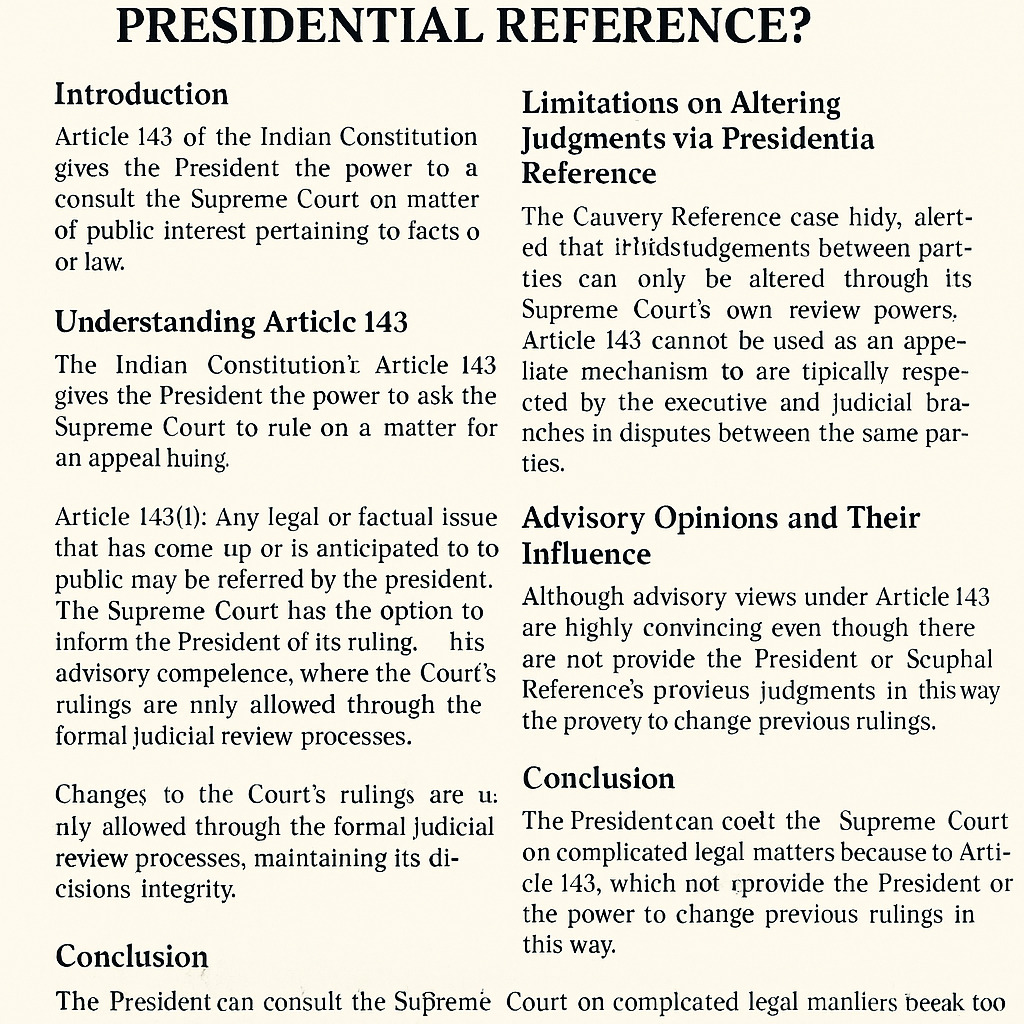View News
Is-It-Possible-to-Modify-Supreme-Court-Decisions-via-Presidential-Reference

Exploring Article 143: Is It Possible to Modify Supreme Court Decisions via Presidential Reference?
Introduction
The Indian Constitution provides for a well-balanced separation of powers among the legislature, executive, and judiciary. Within this framework, Article 143 stands out as a constitutional provision that enables interaction between the executive and the judiciary through the device of a Presidential Reference. It allows the President of India to seek the advisory opinion of the Supreme Court on questions of law or fact that have public significance. However, a pertinent constitutional question arises—Can Supreme Court judgments be altered or modified through this provision?
This article delves into the scope, nature, and limitations of Article 143, particularly exploring whether this power extends to modifying or overturning prior decisions of the apex court.
Understanding Article 143 of the Constitution
Article 143 empowers the President of India to refer certain matters to the Supreme Court for its advisory opinion. The Article is divided into two clauses:
1. Article 143(1): Discretionary Reference
Under this clause:
"If at any time it appears to the President that a question of law or fact has arisen, or is likely to arise, which is of such a nature and of such public importance that it is expedient to obtain the opinion of the Supreme Court upon it, he may refer the question to that Court for consideration..."
-
This provision is discretionary in nature.
-
The Court may or may not choose to give its opinion.
-
The matter must pertain to "public importance" and be legal or factual.
2. Article 143(2): Mandatory Reference
This clause reads:
"The President may refer to the Supreme Court for its opinion disputes arising out of pre-Constitution treaties, agreements, covenants, engagements, or other similar instruments."
-
Such references are mandatory for the Court to answer.
-
This clause is less frequently used.
Nature of Advisory Opinions Under Article 143
An important aspect to understand is that the opinions rendered by the Supreme Court under Article 143 are not binding.
Why Are They Not Binding?
-
The Constitution itself does not mandate enforcement.
-
Article 141 of the Constitution states:
“The law declared by the Supreme Court shall be binding on all courts within the territory of India.”
-
However, this applies to decisions given in actual litigations, not to advisory opinions.
Hence, while the opinions may carry immense persuasive value and are generally followed by the government and courts, they do not have the force of law.
Limitations: Can Article 143 Be Used to Alter Previous Judgments?
The Supreme Court has clarified that Presidential References under Article 143 cannot be used as a tool to alter or overturn its previous judgments, particularly those passed inter partes (between specific parties in a dispute).
Key Judicial Precedent: The Cauvery Reference Case (1993)
In the Cauvery Water Disputes Tribunal matter, a Presidential Reference was made under Article 143 after the Supreme Court delivered its decision. The Court categorically held:
“Article 143 cannot be used as a means to review, reconsider or modify a judgment already pronounced by this Court.”
-
The Court emphasized that judicial finality is a fundamental feature of constitutional adjudication.
-
The only avenue to alter a judgment is via:
-
Review Petition under Article 137, or
-
Curative Petition (as laid down in Rupa Ashok Hurra v. Ashok Hurra, 2002).
-
Therefore, Presidential Reference is not an appellate or review mechanism and cannot be used as a backdoor to seek modification of a verdict.
Advisory Opinions: Influence Without Legal Binding
Even though advisory opinions are not binding, they hold substantial influence in shaping national policies and laws.
Example: 2G Spectrum Allocation Case (2012)
After the Supreme Court cancelled 122 telecom licenses in the 2G spectrum scam, the President made a reference under Article 143 regarding the methodology of natural resource allocation. The Court's opinion, though not binding, became a guiding principle in the formulation of future policy on resource distribution.
Instance of Refusal: Ayodhya Dispute Reference (1993)
In Special Reference No. 1 of 1993, the President sought the Supreme Court’s opinion on whether a temple existed at the disputed site in Ayodhya. The Court declined to render an opinion, stating that the question was not legal in nature but historical and political, hence inappropriate for judicial determination under Article 143.
Comparison with Review Jurisdiction Under Article 137
To alter or review its judgments, the Supreme Court relies on:
-
Article 137: Grants the Court power to review its own judgments or orders.
-
Curative Petitions: As an extraordinary remedy to prevent miscarriage of justice, after the dismissal of a review petition.
These mechanisms have defined procedures and strict limitations, ensuring that judicial finality is preserved unless significant injustice is evident.
Conclusion
Article 143 of the Indian Constitution is a bridge between the executive and judiciary, allowing the President to consult the Supreme Court on important legal and constitutional questions. However, it does not vest power in the President or the Court to review or modify prior judicial decisions.
Such decisions remain binding under Article 141, unless formally reviewed or overturned by the Court under Articles 137 or through curative petitions.
In essence, Article 143 is a consultative tool, not a corrective one. It enriches constitutional jurisprudence by encouraging dialogue between the organs of the State but respects the sanctity and finality of Supreme Court decisions.
Suggested Citation (For Academic Use)
Disclaimer: Every effort has been made to avoid errors or omissions in this material in spite of this, errors may creep in. Any mistake, error or discrepancy noted may be brought to our notice which shall be taken care of in the next edition In no event the author shall be liable for any direct indirect, special or incidental damage resulting from or arising out of or in connection with the use of this information Many sources have been considered including Newspapers, Journals, Bare Acts, Case Materials , Charted Secretary, Research Papers etc
-Prerna Yadav (LegalMantra.net Team)

